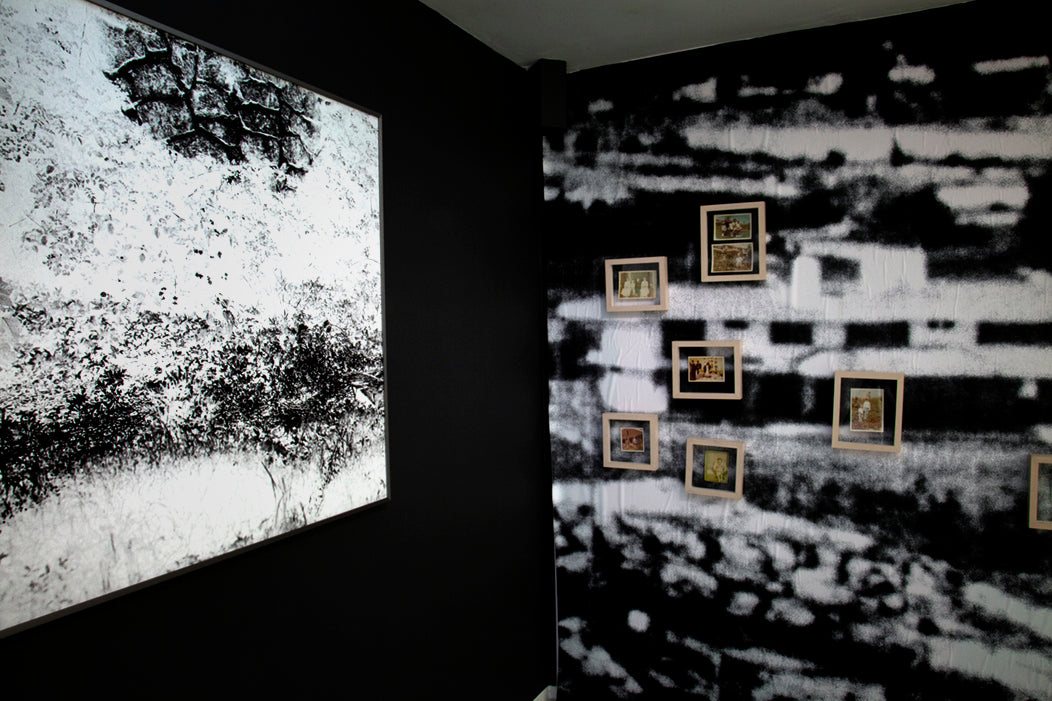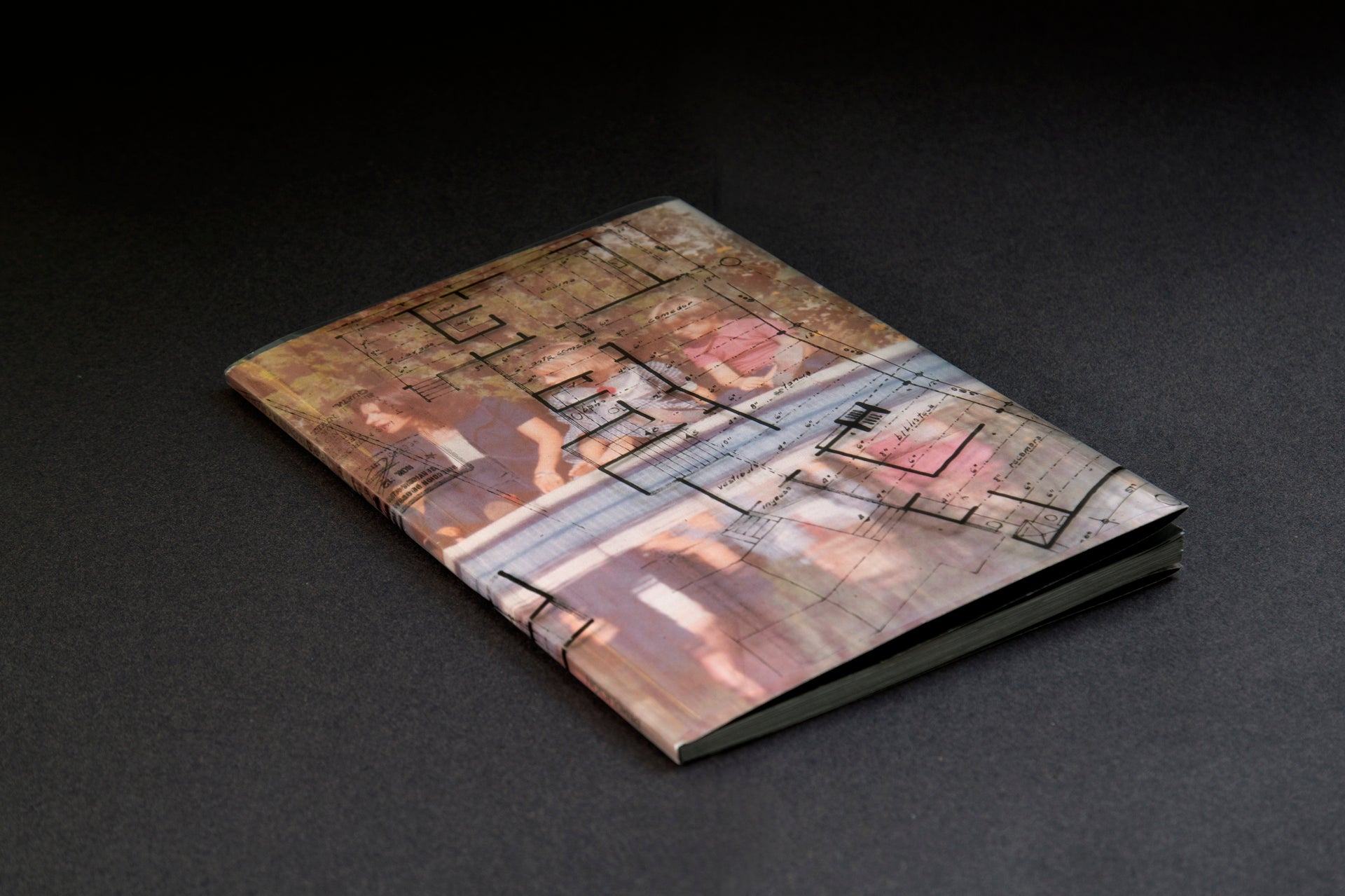DEMOLITIONVERONIQUE CHAPUY
17/05/2020
This work reflects on space and memory through projections in the house, now abandoned, where the author grew up. The projections stage a chronicle of phantasmagoria on the border that confronts fiction with reality, re-signifying memory, life and death.
The photobook Demolition was developed by Veronique Chapuy at program Incubadora de Fotolibros from Hydra + Fotografía, and published in 2018 by INFRAMUNDOour new imprint.
From the book, Demolition is now presented as a solo exhibition, where the staging opens up new narrative possibilities for the work through the use of other media.

DEMOLITIONJoan Fontcuberta
I am interested in linking why suddenly an author like Veronique Chapuy makes this proposal.
I can do no more than throw water into my mill and recover certain arguments about the situation of visual creation at the moment, photographic creation in particular, which is evolving towards a stage that I tentatively call post-photographic and which is characterised by a series of transformations, a metamorphosis, not so much technological, as sociological and anthropological. Today the image no longer represents for us what it did in the 19th century, almost two centuries have passed and it is logical that there should be an adaptation of the functionality that the image means to us.
One of the characteristics of this post-photography is, on the one hand, the proliferation of images, their massification that almost saturates our horizon and drowns us in its magma of often insubstantial images, but on the other hand another aspect is the dematerialisation of the image, that is to say, the image loses its body, therefore, that magical capacity to interact with others.
As a reaction to this situation, there are many paths, many routes that photographic creation takes. Now, for example, there is an interest in the residual, the vestiges, as a farewell and a tribute to the photography that was, to the photography that we still find but that is tending to dissolve and disappear. Another effect, a sudden interest in everything that is vernacular photography, popular photography, those uses of the image that are not necessarily canonised by museums, by experts, by historians, etc.
Suddenly we realise that, in its freshness, in its spontaneity, all this photographic evolution makes a lot of sense.
And it is precisely here that the family photo album takes on its own specific weight. The family album has become a talisman, a cornerstone, of many of the most important projects that are being carried out at the moment. Partly because of this attachment to the natural, but above all because this type of photography takes us back to memory, back to the past, back to the survival of a previous life that you continue to witness. This family album is also disappearing today, how often are our images today taken to a SIM card, to a mobile phone, to the cloud like a hard disk, isn't it? It clearly highlights the dangers of the fragility of these supports. I fear that future generations will not have, as we had, a graphic memory of our past, because these supports are very vulnerable, these supports can be lost and ultimately ruin everything that is the testimony of these lives.
In Veronique's case, she goes in search of the Alibaba cave of personal photographs, family photographs, to make an act that we could consider an act of resilience, that is to say, of recovery, almost an exorcism, I see it as a search for ghosts or the shadows of ghosts. Of phantasmagorias in a somewhat gothic finish, they are very dark images, they are dark images, they are images that speak to us of a reverie, but also of a nightmare.


A nightmare that this work serves to exorcise, to somehow make a reckoning with those experiences that refer us to death, to suffering, to pain, that is to say, it is a way of overcoming a certain degree of mourning.
And it does it in a way that reminds me of the Japanese Kintsugi technique, which consists of suddenly breaking a porcelain cup and instead of throwing it away, what is done is to put it back together in a jigsaw puzzle, but not by hiding the scars but precisely by marking them with a gold resin that gives them even greater value.
The 13th century Sufi poet and mystic RUMI said: It is through the scars that the light enters. And that has been Veronique's task with Demolition.
Joan Fontcuberta
VERONIQUE CHAPUY
Jalisco, Mexico. He has studied photography in several programmes: Bachelor in Photography, Art Institute of Austin, Austin, TX, USA; Curatorial Workshop with Gonzalo Ortega, LivingArtRoom, Monterrey; Arts and Perception with Luc Delannoy, Escuela Adolfo Prieto, Conarte, Monterrey; The Photographic Book with Alejandro Cartagena; Self-Portrait with Francisco Mata Rosas; Discovering our Directions with Allen Frame; and Incubadora de Fotolibros at Hydra + Fotografía.
She has had several solo exhibitions: Self Appropriation, Museo Centenario, San Pedro Garza García, N.L. (2017); Paris J+2 Tristesse, Galería de la Alianza Francesa de Monterrey (2016); Work in Progress, Galería de la Alianza Francesa de Monterrey (2013); and has participated in several group exhibitions such as: Reseña de la plástica Nuevoleonesa, Casa de la Cultura de Nuevo Léon (2016); Walks, Revisión Fotógrafos de Nuevo León (2015); Mother Complex, PFC13, Centro de las Artes. Monterrey, N.L.; Studium Punctum, Centro Cultural 360 Vía, Monterrey, N.L. (2015); Mamá Papá, Colectivo Trece, Galería Bicentenario, Hermosillo, Sonora. She has received several recognitions, among them: Selected for the Fotógrafos de Nuevo León Review, Monterrey (2017); Selected for the program of Incubadora de Fotolibros, Hydra + Fotografía (2016).


DEMOLITION Photobook
We invite you to discover the photobook Demolition by Veronique Chapuy, published in 2018 by INFRAMUNDO, HYDRA's publishing project.
WORK BY VERONIQUE CHAPUY
At Hydra we offer Veronique Chapuy's work for sale.
